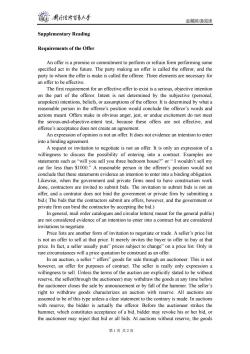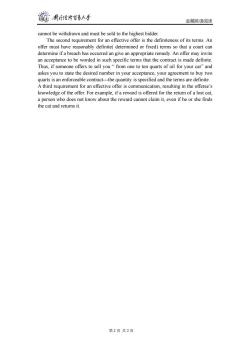对外经济贸易大学:《金融英语阅读》课程教学资源(时文阅读)Requirements of the Offer

制卧价贸易+考 金融英语阅读 Supplementary Reading Requirements of the Offer An offer is a promise or commitment to perform or refrain form performing some specified act in the future.The party making an offer is called the offeror,and the party to whom the offer is make is called the offeree.Three elements are necessary for an offer to be effective. The first requirement for an effective offer to exist is a serious,objective intention on the part of the offeror.Intent is not determined by the subjective (personal, unspoken)intentions,beliefs,or assumptions of the offeror.It is determined by what a reasonable person in the offeree's position would conclude the offeror's words and actions meant.Offers make in obvious anger,jest,or undue excitement do not meet the serous-and-objective-intent test,because these offers are not effective,and offeree's acceptance does not create an agreement. An expression of opinion is not an offer.It does not evidence an intention to enter into a binding agreement. A request or invitation to negotiate is not an offer.It is only an expression of a willingness to discuss the possibility of entering into a contract.Examples are statements such as "will you sell you three bedroom house?"or"I wouldn't sell my car for less than $1000."A reasonable person in the offeree's position would not conclude that these statements evidence an intention to enter into a binding obligation. Likewise,when the government and private firms need to have construction work done,contractors are invited to submit bids.The invitation to submit bids is not an offer,and a contrator does not bind the government or private firm by submitting a bid.(The bids that the contractors submit are offers,however,and the government or private firm can bind the contractor by accepting the bid.) In general,mail order catalogues and circular letters(meant for the general public) are not considered evidence of an intention to enter into a contract but are considered invitations to negotiate. Price lists are another form of invitation to negotiate or trade.A seller's price list is not an offer to sell at that price.It merely invites the buyer to offer to buy at that price.In fact,a seller usually puts"prices subject to change"on a price list.Only in rare circumstances will a price quotation be construed as an offer. In an auction,a seller"offers"goods for sale through an auctioneer.This is not however,an offer for purposes of contract.The seller is really only expression a willingness to sell.Unless the terms of the auction are explicitly stated to be without reserve,the seller(through the auctioneer)may withdraw the goods at any time before the auctioneer closes the sale by announcement or by fall of the hammer.The seller's right to withdraw goods characterizes an auction with reserve.All auctions are assumed to be of this type unless a clear statement to the contrary is made.In auctions with reserve,the bidder is actually the offeror.Before the auctioneer strikes the hammer,which constitutes acceptance of a bid,bidder may revoke his or her bid,or the auctioneer may reject that bid or all bids.At auctions without reserve,the goods 第1页共2页
金融英语阅读 Supplementary Reading Requirements of the Offer An offer is a promise or commitment to perform or refrain form performing some specified act in the future. The party making an offer is called the offeror, and the party to whom the offer is make is called the offeree. Three elements are necessary for an offer to be effective. The first requirement for an effective offer to exist is a serious, objective intention on the part of the offeror. Intent is not determined by the subjective (personal, unspoken) intentions, beliefs, or assumptions of the offeror. It is determined by what a reasonable person in the offeree’s position would conclude the offeror’s words and actions meant. Offers make in obvious anger, jest, or undue excitement do not meet the serous-and-objective-intent test, because these offers are not effective, and offeree’s acceptance does not create an agreement. An expression of opinion is not an offer. It does not evidence an intention to enter into a binding agreement. A request or invitation to negotiate is not an offer. It is only an expression of a willingness to discuss the possibility of entering into a contract. Examples are statements such as “will you sell you three bedroom house?” or “ I wouldn’t sell my car for less than $1000.” A reasonable person in the offeree’s position would not conclude that these statements evidence an intention to enter into a binding obligation. Likewise, when the government and private firms need to have construction work done, contractors are invited to submit bids. The invitation to submit bids is not an offer, and a contrator does not bind the government or private firm by submitting a bid.( The bids that the contractors submit are offers, however, and the government or private firm can bind the contractor by accepting the bid.) In general, mail order catalogues and circular letters( meant for the general public) are not considered evidence of an intention to enter into a contract but are considered invitations to negotiate. Price lists are another form of invitation to negotiate or trade. A seller’s price list is not an offer to sell at that price. It merely invites the buyer to offer to buy at that price. In fact, a seller usually puts” prices subject to change” on a price list. Only in rare circumstances will a price quotation be construed as an offer. In an auction, a seller “ offers” goods for sale through an auctioneer. This is not however, an offer for purposes of contract. The seller is really only expression a willingness to sell. Unless the terms of the auction are explicitly stated to be without reserve, the seller(through the auctioneer) may withdraw the goods at any time before the auctioneer closes the sale by announcement or by fall of the hammer. The seller’s right to withdraw goods characterizes an auction with reserve. All auctions are assumed to be of this type unless a clear statement to the contrary is made. In auctions with reserve, the bidder is actually the offeror. Before the auctioneer strikes the hammer, which constitutes acceptance of a bid, bidder may revoke his or her bid, or the auctioneer may reject that bid or all bids. At auctions without reserve, the goods 第 1 页 共 2 页

莲 制卧台贸易上兰 金融英语阅读 cannot be withdrawn and must be sold to the highest bidder. The second requirement for an effective offer is the definiteness of its terms.An offer must have reasonably definite(determined or fixed)terms so that a court can determine if a breach has occurred an give an appropriate remedy.An offer may invite an acceptance to be worded in such specific terms that the contract is made definite. Thus,if someone offers to sell you"from one to ten quarts of oil for your car"and askes you to state the desired number in your acceptance,your agreement to buy two quarts is an enforceable contract---the quantity is specified and the terms are definite. A third requirement for an effective offer is communication,resulting in the offeree's knowledge of the offer.For example,if a reward is offered for the return of a lost cat, a person who does not know about the reward cannot claim it,even if he or she finds the cat and returns it. 第2页共2页
金融英语阅读 cannot be withdrawn and must be sold to the highest bidder. The second requirement for an effective offer is the definiteness of its terms. An offer must have reasonably definite( determined or fixed) terms so that a court can determine if a breach has occurred an give an appropriate remedy. An offer may invite an acceptance to be worded in such specific terms that the contract is made definite. Thus, if someone offers to sell you “ from one to ten quarts of oil for your car” and askes you to state the desired number in your acceptance, your agreement to buy two quarts is an enforceable contract---the quantity is specified and the terms are definite. A third requirement for an effective offer is communication, resulting in the offeree’s knowledge of the offer. For example, if a reward is offered for the return of a lost cat, a person who does not know about the reward cannot claim it, even if he or she finds the cat and returns it. 第 2 页 共 2 页
按次数下载不扣除下载券;
注册用户24小时内重复下载只扣除一次;
顺序:VIP每日次数-->可用次数-->下载券;
- 对外经济贸易大学:《金融英语阅读》课程教学资源(时文阅读)Ito-Yokado dumps stock at discount.pdf
- 对外经济贸易大学:《金融英语阅读》课程教学资源(时文阅读)THE SCANDAL EFFECT.pdf
- 对外经济贸易大学:《金融英语阅读》课程教学资源(时文阅读)Euro Turns Five:Europe's Grand Experiment.pdf
- 对外经济贸易大学:《金融英语阅读》课程教学资源(时文阅读)Building a strong Board.pdf
- 对外经济贸易大学:《金融英语阅读》课程教学资源(时文阅读)China's macro-control policy needs readjustment.pdf
- 对外经济贸易大学:《金融英语阅读》课程教学资源(时文阅读)The Kremlin repents, maybe.pdf
- 对外经济贸易大学:《金融英语阅读》课程教学资源(时文阅读)Stability and Growth in the International Financial System.pdf
- 对外经济贸易大学:《金融英语阅读》课程教学资源(时文阅读)IMF focuses on financing needs after devastating tsunami.pdf
- 对外经济贸易大学:《金融英语阅读》课程教学资源(时文阅读)James D. Wolfensohn and the World Bank.pdf
- 对外经济贸易大学:《金融英语阅读》课程教学资源(时文阅读)Banks open to increased foreign investment.pdf
- 对外经济贸易大学:《金融英语阅读》课程教学资源(作业)12.pdf
- 对外经济贸易大学:《金融英语阅读》课程教学资源(作业)11.pdf
- 对外经济贸易大学:《金融英语阅读》课程教学资源(作业)10.pdf
- 对外经济贸易大学:《金融英语阅读》课程教学资源(作业)09.pdf
- 对外经济贸易大学:《金融英语阅读》课程教学资源(作业)08.pdf
- 对外经济贸易大学:《金融英语阅读》课程教学资源(作业)07.pdf
- 对外经济贸易大学:《金融英语阅读》课程教学资源(作业)06.pdf
- 对外经济贸易大学:《金融英语阅读》课程教学资源(作业)05.pdf
- 对外经济贸易大学:《金融英语阅读》课程教学资源(作业)04.pdf
- 对外经济贸易大学:《金融英语阅读》课程教学资源(作业)03.pdf
- 对外经济贸易大学:《金融英语阅读》课程教学资源(时文阅读)Time to Tap Your Nest Egg?.pdf
- 对外经济贸易大学:《金融英语阅读》课程教学资源(授课教案)Chapter 01 The Banking Industry in China.pdf
- 对外经济贸易大学:《金融英语阅读》课程教学资源(授课教案)Chapter 02 The world Bank.pdf
- 对外经济贸易大学:《金融英语阅读》课程教学资源(授课教案)Chapter 03 The Financial System.pdf
- 对外经济贸易大学:《金融英语阅读》课程教学资源(授课教案)Chapter 04 International Monetary Fund(IMF).pdf
- 对外经济贸易大学:《金融英语阅读》课程教学资源(授课教案)Chapter 05 Politics vs. Economics.pdf
- 对外经济贸易大学:《金融英语阅读》课程教学资源(授课教案)Chapter 06 Money.pdf
- 对外经济贸易大学:《金融英语阅读》课程教学资源(授课教案)Chapter 07 Macroeconomics of International Currencies.pdf
- 对外经济贸易大学:《金融英语阅读》课程教学资源(授课教案)Chapter 08 Bretton Woods and the Gold Exchange Standard.pdf
- 对外经济贸易大学:《金融英语阅读》课程教学资源(授课教案)Chapter 09 Assessing Investment Systems.pdf
- 对外经济贸易大学:《金融英语阅读》课程教学资源(授课教案)Chapter 10 Investment Products and Services Provided by Insurers.pdf
- 对外经济贸易大学:《金融英语阅读》课程教学资源(授课教案)Chapter 11 Pooling of Interests Accounting.pdf
- 对外经济贸易大学:《金融英语阅读》课程教学资源(授课教案)Chapter 12 Invitation for Bids.pdf
- 对外经济贸易大学:《阿拉伯语经贸谈判与口译 Arabic Business Negotiation》课程教学资源(作业习题)课后作业.pdf
- 对外经济贸易大学:《阿拉伯语经贸谈判与口译 Arabic Business Negotiation》课程教学资源(试题)期末考试试卷(A卷)答案.pdf
- 对外经济贸易大学:《阿拉伯语经贸谈判与口译 Arabic Business Negotiation》课程教学资源(试题)期末考试试卷(A卷)试题.pdf
- 对外经济贸易大学:《阿拉伯语经贸谈判与口译 Arabic Business Negotiation》课程教学资源(试题)期末考试试卷(B卷)答案.pdf
- 对外经济贸易大学:《阿拉伯语经贸谈判与口译 Arabic Business Negotiation》课程教学资源(试题)期末考试试卷(B卷)试题.pdf
- 对外经济贸易大学:《阿拉伯语经贸谈判与口译 Arabic Business Negotiation》课程教学资源(授课教案)第一讲 中国对外贸易与经济合作政策(杨言洪).pdf
- 对外经济贸易大学:《阿拉伯语经贸谈判与口译 Arabic Business Negotiation》课程教学资源(授课教案)第二讲 价格条款谈判(一)التفاوض في شروط الأسعار(أ).pdf
